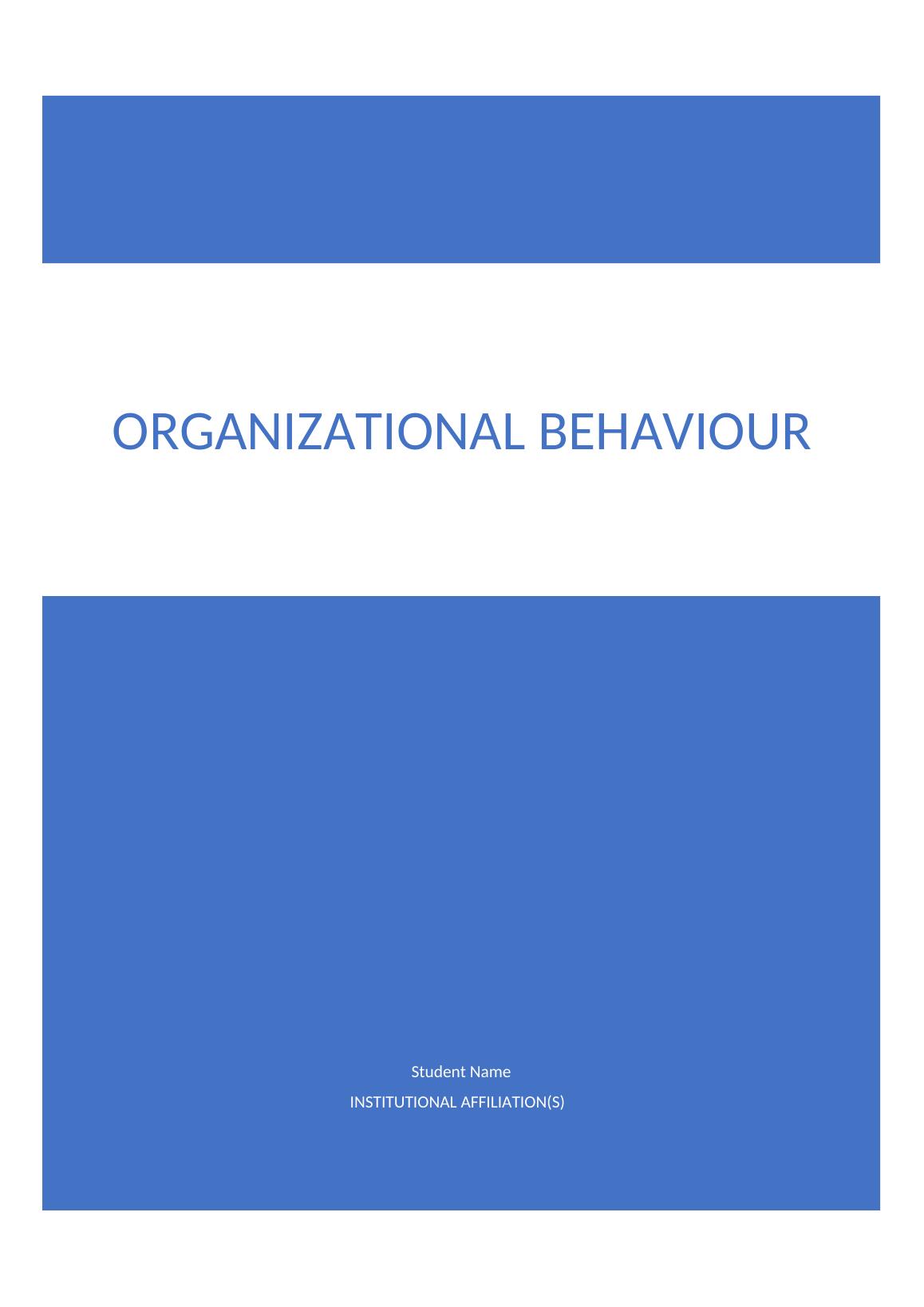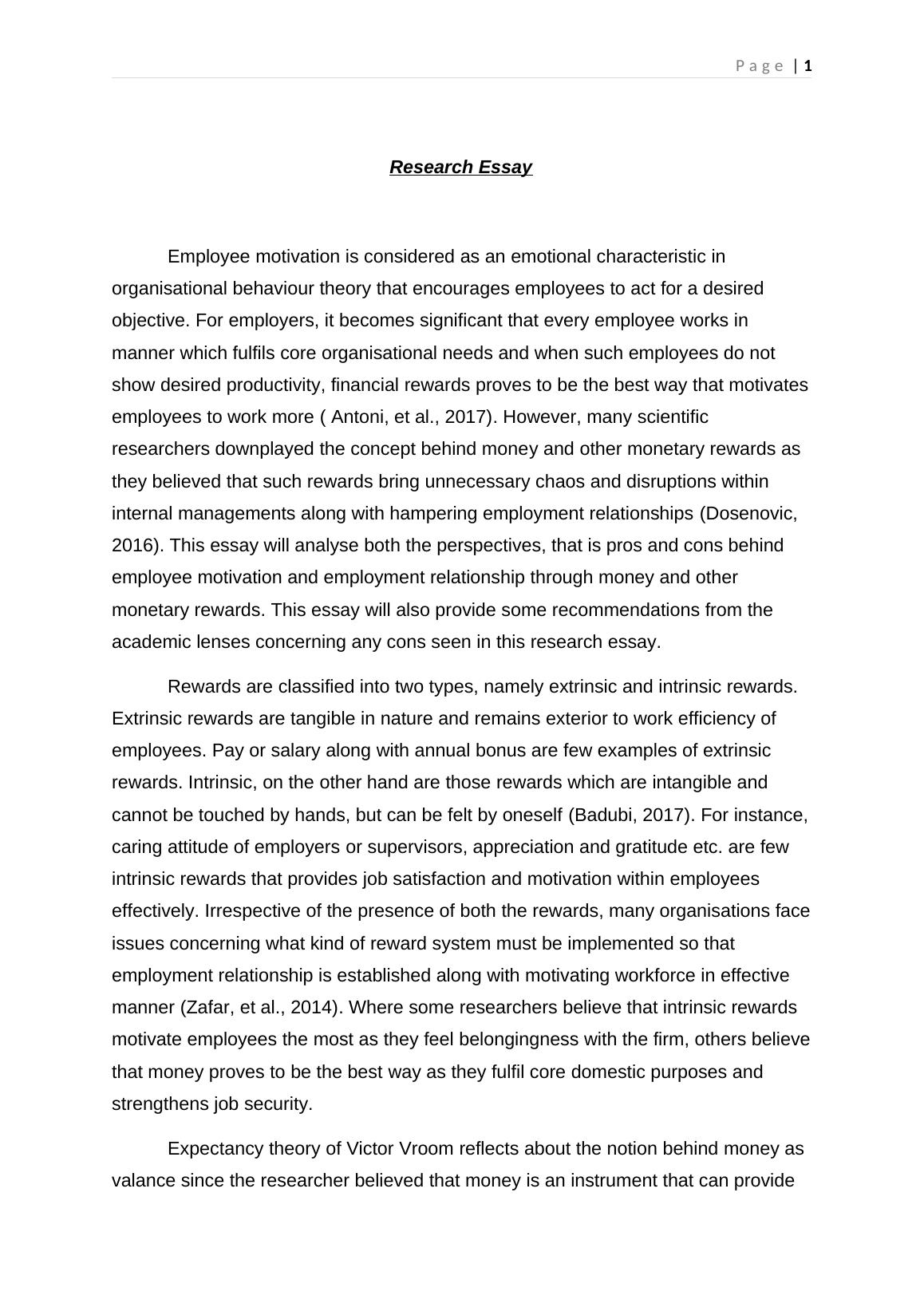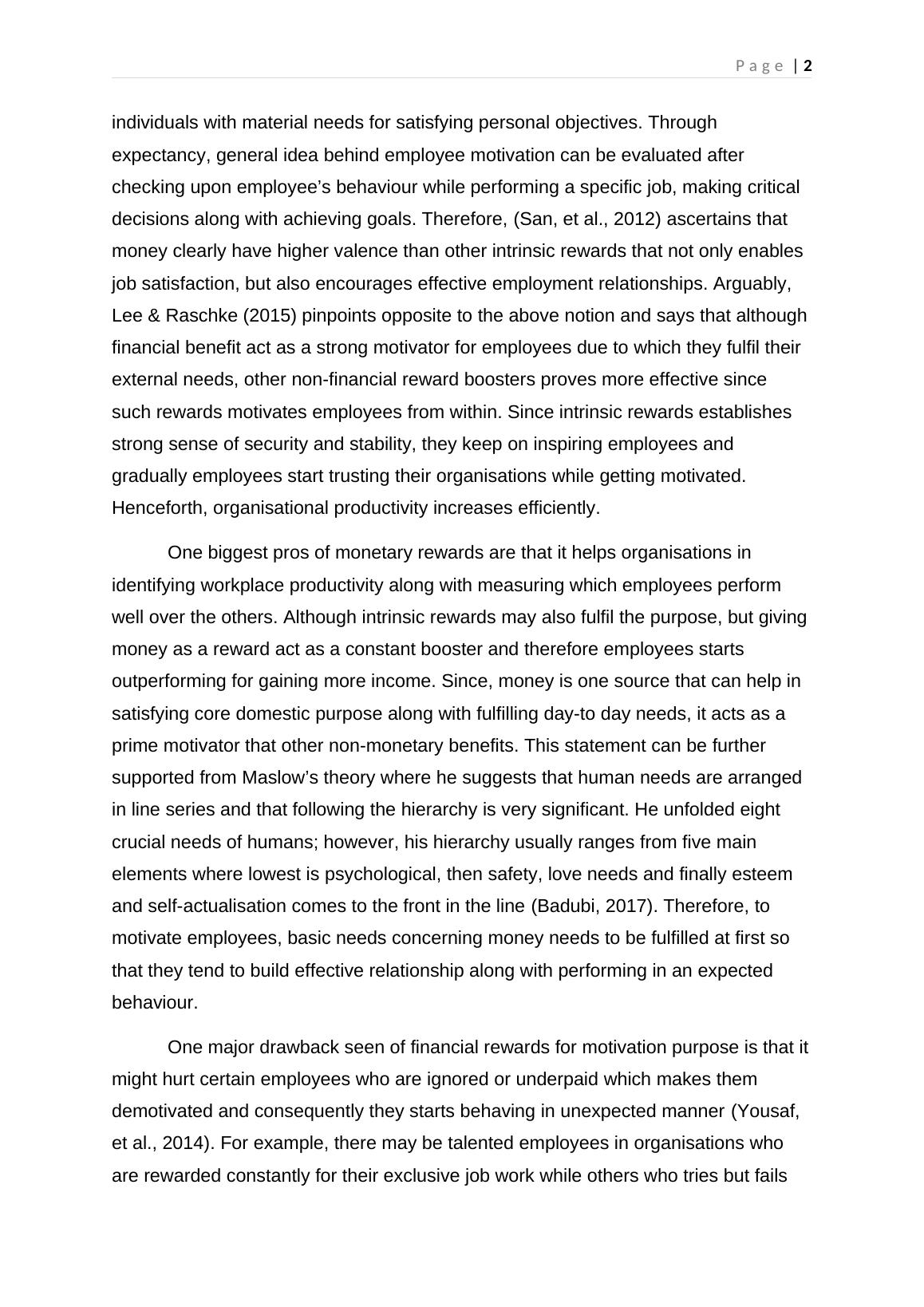Pros and Cons of Employee Motivation through Monetary Rewards
Added on 2023-01-19
8 Pages2265 Words41 Views
Student Name
INSTITUTIONAL AFFILIATION(S)
ORGANIZATIONAL BEHAVIOUR
INSTITUTIONAL AFFILIATION(S)
ORGANIZATIONAL BEHAVIOUR

P a g e | 1
Research Essay
Employee motivation is considered as an emotional characteristic in
organisational behaviour theory that encourages employees to act for a desired
objective. For employers, it becomes significant that every employee works in
manner which fulfils core organisational needs and when such employees do not
show desired productivity, financial rewards proves to be the best way that motivates
employees to work more ( Antoni, et al., 2017). However, many scientific
researchers downplayed the concept behind money and other monetary rewards as
they believed that such rewards bring unnecessary chaos and disruptions within
internal managements along with hampering employment relationships (Dosenovic,
2016). This essay will analyse both the perspectives, that is pros and cons behind
employee motivation and employment relationship through money and other
monetary rewards. This essay will also provide some recommendations from the
academic lenses concerning any cons seen in this research essay.
Rewards are classified into two types, namely extrinsic and intrinsic rewards.
Extrinsic rewards are tangible in nature and remains exterior to work efficiency of
employees. Pay or salary along with annual bonus are few examples of extrinsic
rewards. Intrinsic, on the other hand are those rewards which are intangible and
cannot be touched by hands, but can be felt by oneself (Badubi, 2017). For instance,
caring attitude of employers or supervisors, appreciation and gratitude etc. are few
intrinsic rewards that provides job satisfaction and motivation within employees
effectively. Irrespective of the presence of both the rewards, many organisations face
issues concerning what kind of reward system must be implemented so that
employment relationship is established along with motivating workforce in effective
manner (Zafar, et al., 2014). Where some researchers believe that intrinsic rewards
motivate employees the most as they feel belongingness with the firm, others believe
that money proves to be the best way as they fulfil core domestic purposes and
strengthens job security.
Expectancy theory of Victor Vroom reflects about the notion behind money as
valance since the researcher believed that money is an instrument that can provide
Research Essay
Employee motivation is considered as an emotional characteristic in
organisational behaviour theory that encourages employees to act for a desired
objective. For employers, it becomes significant that every employee works in
manner which fulfils core organisational needs and when such employees do not
show desired productivity, financial rewards proves to be the best way that motivates
employees to work more ( Antoni, et al., 2017). However, many scientific
researchers downplayed the concept behind money and other monetary rewards as
they believed that such rewards bring unnecessary chaos and disruptions within
internal managements along with hampering employment relationships (Dosenovic,
2016). This essay will analyse both the perspectives, that is pros and cons behind
employee motivation and employment relationship through money and other
monetary rewards. This essay will also provide some recommendations from the
academic lenses concerning any cons seen in this research essay.
Rewards are classified into two types, namely extrinsic and intrinsic rewards.
Extrinsic rewards are tangible in nature and remains exterior to work efficiency of
employees. Pay or salary along with annual bonus are few examples of extrinsic
rewards. Intrinsic, on the other hand are those rewards which are intangible and
cannot be touched by hands, but can be felt by oneself (Badubi, 2017). For instance,
caring attitude of employers or supervisors, appreciation and gratitude etc. are few
intrinsic rewards that provides job satisfaction and motivation within employees
effectively. Irrespective of the presence of both the rewards, many organisations face
issues concerning what kind of reward system must be implemented so that
employment relationship is established along with motivating workforce in effective
manner (Zafar, et al., 2014). Where some researchers believe that intrinsic rewards
motivate employees the most as they feel belongingness with the firm, others believe
that money proves to be the best way as they fulfil core domestic purposes and
strengthens job security.
Expectancy theory of Victor Vroom reflects about the notion behind money as
valance since the researcher believed that money is an instrument that can provide

P a g e | 2
individuals with material needs for satisfying personal objectives. Through
expectancy, general idea behind employee motivation can be evaluated after
checking upon employee’s behaviour while performing a specific job, making critical
decisions along with achieving goals. Therefore, (San, et al., 2012) ascertains that
money clearly have higher valence than other intrinsic rewards that not only enables
job satisfaction, but also encourages effective employment relationships. Arguably,
Lee & Raschke (2015) pinpoints opposite to the above notion and says that although
financial benefit act as a strong motivator for employees due to which they fulfil their
external needs, other non-financial reward boosters proves more effective since
such rewards motivates employees from within. Since intrinsic rewards establishes
strong sense of security and stability, they keep on inspiring employees and
gradually employees start trusting their organisations while getting motivated.
Henceforth, organisational productivity increases efficiently.
One biggest pros of monetary rewards are that it helps organisations in
identifying workplace productivity along with measuring which employees perform
well over the others. Although intrinsic rewards may also fulfil the purpose, but giving
money as a reward act as a constant booster and therefore employees starts
outperforming for gaining more income. Since, money is one source that can help in
satisfying core domestic purpose along with fulfilling day-to day needs, it acts as a
prime motivator that other non-monetary benefits. This statement can be further
supported from Maslow’s theory where he suggests that human needs are arranged
in line series and that following the hierarchy is very significant. He unfolded eight
crucial needs of humans; however, his hierarchy usually ranges from five main
elements where lowest is psychological, then safety, love needs and finally esteem
and self-actualisation comes to the front in the line (Badubi, 2017). Therefore, to
motivate employees, basic needs concerning money needs to be fulfilled at first so
that they tend to build effective relationship along with performing in an expected
behaviour.
One major drawback seen of financial rewards for motivation purpose is that it
might hurt certain employees who are ignored or underpaid which makes them
demotivated and consequently they starts behaving in unexpected manner (Yousaf,
et al., 2014). For example, there may be talented employees in organisations who
are rewarded constantly for their exclusive job work while others who tries but fails
individuals with material needs for satisfying personal objectives. Through
expectancy, general idea behind employee motivation can be evaluated after
checking upon employee’s behaviour while performing a specific job, making critical
decisions along with achieving goals. Therefore, (San, et al., 2012) ascertains that
money clearly have higher valence than other intrinsic rewards that not only enables
job satisfaction, but also encourages effective employment relationships. Arguably,
Lee & Raschke (2015) pinpoints opposite to the above notion and says that although
financial benefit act as a strong motivator for employees due to which they fulfil their
external needs, other non-financial reward boosters proves more effective since
such rewards motivates employees from within. Since intrinsic rewards establishes
strong sense of security and stability, they keep on inspiring employees and
gradually employees start trusting their organisations while getting motivated.
Henceforth, organisational productivity increases efficiently.
One biggest pros of monetary rewards are that it helps organisations in
identifying workplace productivity along with measuring which employees perform
well over the others. Although intrinsic rewards may also fulfil the purpose, but giving
money as a reward act as a constant booster and therefore employees starts
outperforming for gaining more income. Since, money is one source that can help in
satisfying core domestic purpose along with fulfilling day-to day needs, it acts as a
prime motivator that other non-monetary benefits. This statement can be further
supported from Maslow’s theory where he suggests that human needs are arranged
in line series and that following the hierarchy is very significant. He unfolded eight
crucial needs of humans; however, his hierarchy usually ranges from five main
elements where lowest is psychological, then safety, love needs and finally esteem
and self-actualisation comes to the front in the line (Badubi, 2017). Therefore, to
motivate employees, basic needs concerning money needs to be fulfilled at first so
that they tend to build effective relationship along with performing in an expected
behaviour.
One major drawback seen of financial rewards for motivation purpose is that it
might hurt certain employees who are ignored or underpaid which makes them
demotivated and consequently they starts behaving in unexpected manner (Yousaf,
et al., 2014). For example, there may be talented employees in organisations who
are rewarded constantly for their exclusive job work while others who tries but fails

End of preview
Want to access all the pages? Upload your documents or become a member.
Related Documents
Pros and Cons of Using Financial Rewards to Motivate Employeeslg...
|8
|2323
|27
Pros and Cons of Using Money as a Motivator in Employment Relationshipslg...
|8
|2377
|74
Pros and Cons of Monetary Rewards in Employee Motivationlg...
|8
|2286
|24
Money and Other Financial Rewards in Employee Motivationlg...
|8
|2308
|56
Role of Monetary Rewards in Building Relationship with Employees and Motivating Themlg...
|7
|2167
|89
Impact of monetary rewards on employee relationship and motivationlg...
|7
|2241
|370
